The Chives grow best in well-drained fertile soil in sunshine or partial shade. The Chives need nutrients to grow and thrive. If your Chives are not getting it, it can stop enough nutrients, growth, and development. In general, Chives do not require much fertilizer to grow. But you can consider fertilization after the Chives plant is two years old and after you have done two harvests. Let’s find out the best fertilizer for Chives.
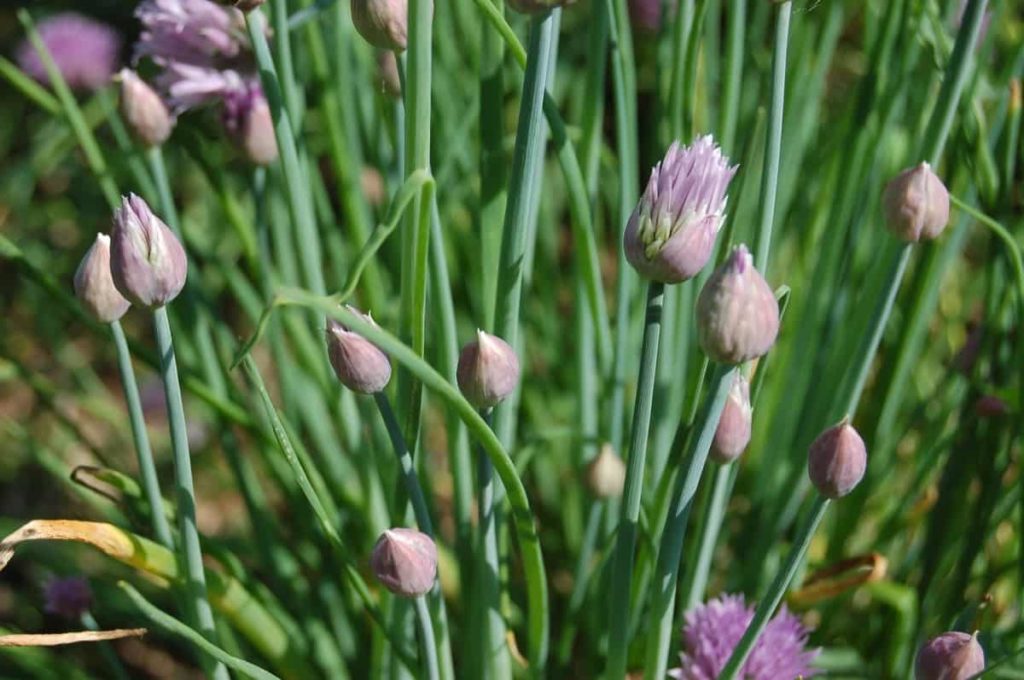
If your Chives are grown in large pots or gardens, they will need less fertilization. Fertilization is essential for indoor potted Chives. Chive plants require very little caring and will thrive without fertilization, but they will enjoy the promotion of nutrients with fertilizer or fertilization dressing aside monthly. If you already have soil, work in any compost and fertilizer. The Chives can grow in most soil types, but additional organic material will improve their performance.
The Chives can survive dry periods, but Chives thrive on excess water during the summer so that their growth remains lush. They are also tolerant of frost and will die in the autumn but grow again in spring. In general, the Chives do not need to be overfed. If you are growing it in large pots, it is especially true. To keep your Chives healthy and happy, you have to apply organic or synthetic fertilizer whenever the leaves have started to yellow. The leaves turning yellow is a clear sign of a lack of nutrients in the soil.
Applying fertilizers at recommended rates helps the Chives to produce high foliage and a healthy root system. Once you use nutrients in fertilizers, your Chives growth should improve. Avoid fertilizing more than 1 to 2 times a year. Too much fertilization, especially fertilizers with a high nitrogen ratio, can burn the Chive plant and cause weak roots. It will result in more pests and diseases.
In case you miss this: Growing Chives in Pots, Planting, Care – A Full Guide
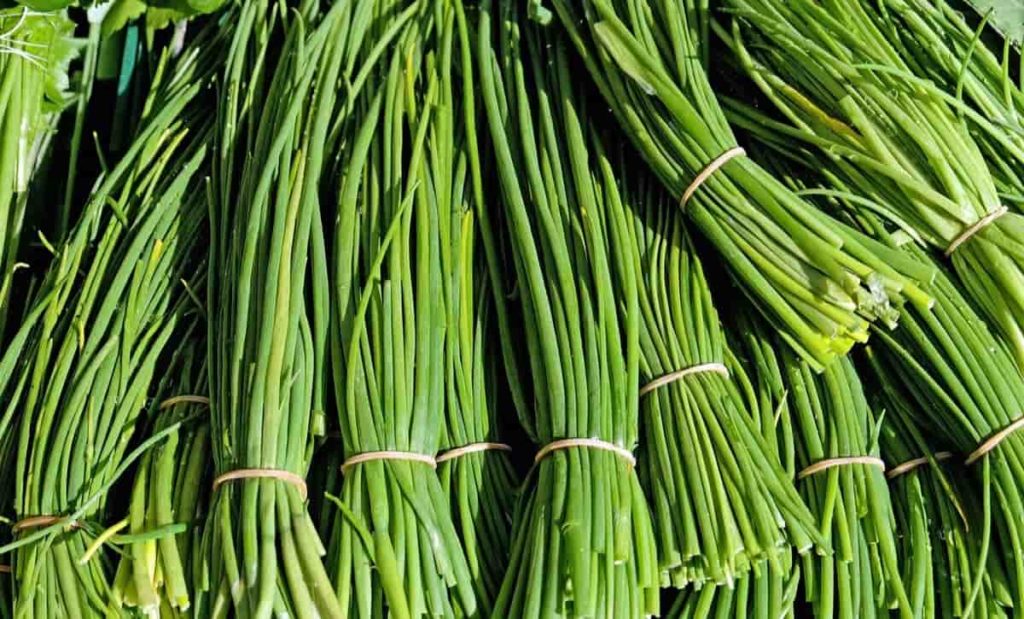
Best fertilizer for Chives
Homemade fertilizers for Chives
- Coffee grounds – Like compost, coffee grounds are great for fertilizing Chive plants, as they provide essential nutrients keeping the soil slightly acidic.
- Eggshells – Drop a handful of crushed eggshells around the roots. It will gradually decompose and provide calcium to Chives plants.
- Lime – Chives don’t like very acidic soils. Apply lime or dolomite to the ground once or twice a year.
- Amend the potting mix with 1/2 cup of alfalfa meal or soya meal per 30 centimeters of the pot or 2 cups with worm castings for healthy growth of Chives.
Organic fertilizers for Chives
- Add alfalfa meal and soybean meal when planting for a more luxurious crop.
- Bone meal – You can add approximately 1 to 2 cups of bone meal per square yard can be added to the soil to make the best soil conditions.
- Blood meal – You can use blood meal fertilizer wherever nitrogen fertilizer is required. Nitrogen is responsible for growth and greens in plants, and since Chives are green plants, blood meal would be ideal.
Liquid fertilizers for Chives
Avoid more nitrogen fertilizers, and lightly fertilize when you do. Heavy fertilizer applications will negatively affect the taste of the Chives. If you have organic matter in the soil at the time of planting, it is not necessary to feed until later in the season. However, if you cut the Chives frequently, give them a shot of fish emulsion, compost extract, or compost tea to encourage regrowth.
In case you miss this: Growing Hydroponic Chives, Planting, Care, Harvesting
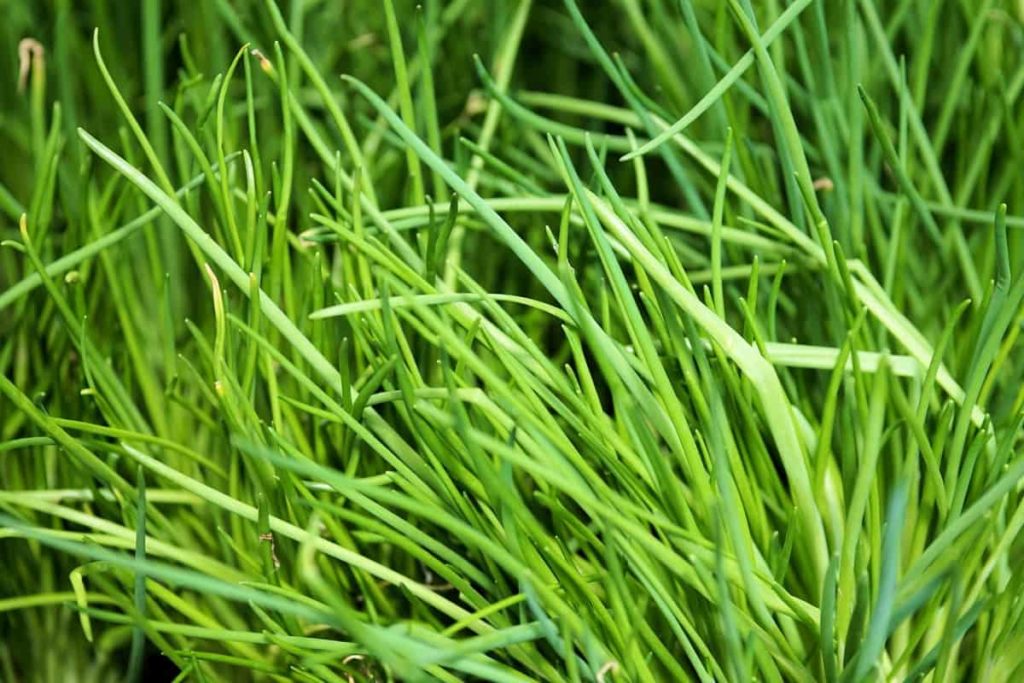
Compost manure for Chives
- Manure – Dig several inches of well-composted manure (chicken manure) before planting if your soil is poor. Dig in lots of organic matter like garden compost, well-rotted manure, or other soil-improving, especially in well-drained sandy soil, to keep moisture.
- Worm castings – Chives are most successful in soil rich in nutrients and drains moist but well. Modify the ground with worm castings for best-growing results.
Natural fertilizers for Chives
Mulching is minimal and usually gets rid of the weed population. It insulates the soil by placing it at high temperatures, which is particularly easy during spring temperature fluctuations. Mulch keeps the ground immediately cool and moist around the plants. Using organic mulches like wooden chips, chopped leaves, yard clippings, pine bark, and straw would be better. After the plants are about 6 inches long, mulch the bed with 2-inch layers of bark; combining small plants can suppress their growth.
Commercial fertilizers for Chives
When preparing the soil for Chives, dig in low nitrogen 5-10-10 fertilizer at 1/2 pounds for 100 square feet. If the plant appears to be under stress, you can start applying dilute liquid organic fertilizer every spring. Use very light 5-10-5 (NPK) organic fertilizer at half of the recommended strength every four to six weeks for plants grown in sunlight without filtering out or inside the garden. Chives need a little extra fertilizer to produce as much as they can. You can side dress with one teaspoon of 21-0-0 fertilizer per square foot to ensure good growth and higher yield.
Chive’s fertilizer schedule
Determine the fertilizer requirements with a soil test before planting and then follow the recommendations given in the test report. If fertilizer applications are required, work the fertilizer in the top 6 inches of soil. If you fertilize with compost, apply well over 100 square feet of garden area with more than 1 inch of fertilizer well-composted organic matter. Before planting Chives, serve as a well-composted organic matter of 4 to 6 inches of fertilizer like manure in the soil.
In case you miss this: How to Start Perennial Garden from Scratch: Steps, Ideas, Tips, and Techniques
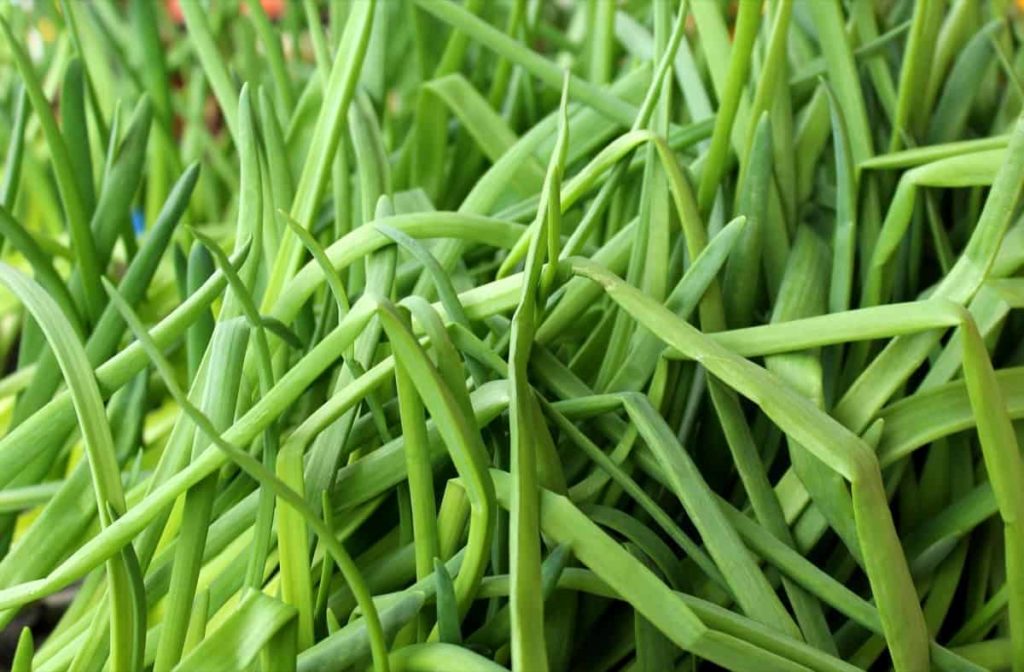
Chives do very well when allowed to grow in an area rich in wet organic nutrients. Chives grow well when allowed to grow in an area rich in moist organic nutrients. Adding manure to soil also helps in drainage. If planted in such an area, the Chives would generally not need extra fertilizer. However, Chives cut every year can be weak and will require additional fertilizer. Apply a light application of 5-10-5 fertilizer, or about 1/4 cup, to increase the strength of the Chives. Work the fertilizer in the soil, and perform this process in spring for the best results.
You have to use this type of fertilizer only once a year. If necessary, apply liquid fertilizer to the soil of the Chives grown outdoors in the containers or Chives grown every four to six weeks in the summer months indoors. Use half of the manufacturer’s recommended food. Apply nitrogen and sulfur-based fertilizer. The nitrogen helps boost growth, and sulfur maintains the aroma and taste of Chives.
How to fertilize Chives in pots
When growing Chives indoors, place the Chives plants in a sunny place. If the potting mix is of poor quality, it will thin the Chives in the pots. After planting, water Chives even start to drain out of the holes under the pot; then, before watering again, let the soil dry a little when growing Chives in the pots. One of the simplest ways to test soil moisture is to insert your finger into the soil near the edge of the pot.
Consume fertilizer every two weeks from spring to late summer using balanced, granule manure similar to 3-3-3 formulas. Use a tablespoon for a 6 to 8-inch diameter pot. Use two tablespoons for large pots, between 10 and 12 inches. Sprinkle the fertilizer around the soil on the base of the plant. Water, after the application of every fertilizer, releases nutrients. Fertilizer applications may vary by product if the package label indicates a specific amount, following the manufacturer’s guidelines. Stop fertilizing the Chives in winter to allow plants to rest.
In case you miss this: Top 10 Tips to Protect Plants from Frost: Ideas and Techniques for Beginners

Frequently asked questions about fertilizers for Chives (FAQ)
How can I thicker my Chives?
To ensure that the Chives become thick, select organically rich, well-draining soil. Grow Chives in sandy loam soil. This soil does not maintain much water in the root part and works well as drainage.
Is it easy to grow Chives?
The Chives are low maintenance, easy to grow perennial herbs. These are a delicious addition to salads and can be added to many other flavored dishes.
Do the Chives do well in pots?
Chives grow well in pots but are best suited to grow in the ground.
In case you miss this: Top 25 Fast Growing Vegetables in Pots
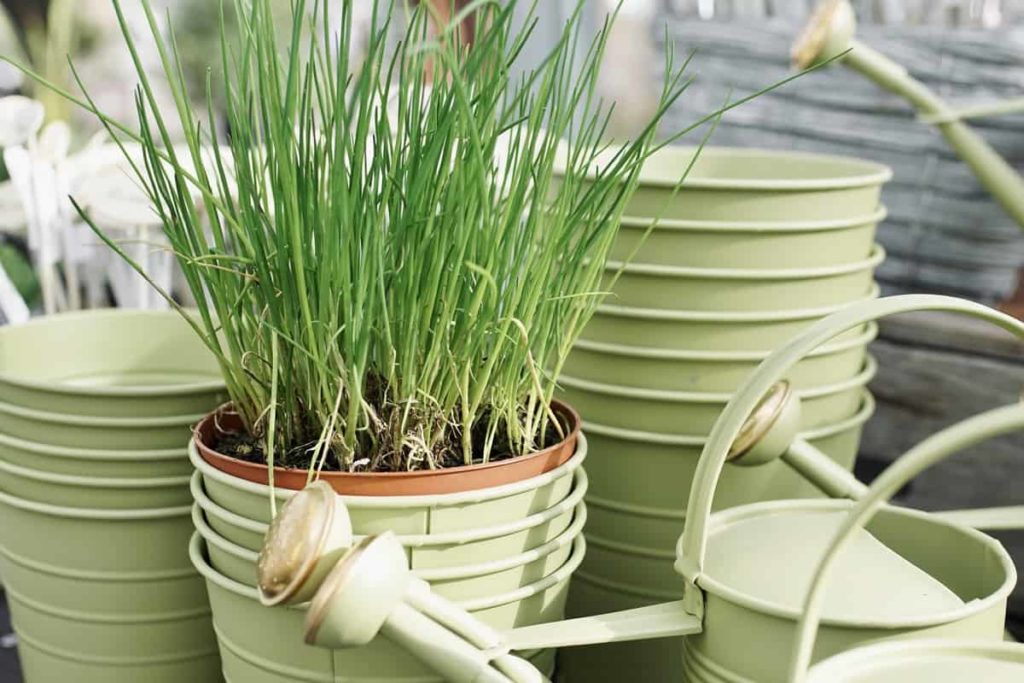
Why do my Chives have brown tips?
Chives need moderate regular water to be established; established plants will survive in dry soil. The tips of the leaves of the plants that dry will turn brown and papery.
How often do you water potted Chives?
Water the pot well, and continue to water every day or more, maintaining a high surface moisture level until the seeds grow once the Chives sprouts are about an inch or more, thin them to be at least three inches apart.
How do you keep the Chives alive?
The Chives are very easy to take care of; they need minimal maintenance. Keep the soil moist by regularly watering in extended dry periods in summer and feeding with granulated plant food every spring.
How long will the Chives grow?
The Chives produce edible branches during summer and fall. Because the stems are usually ready for harvesting around the first bloom, or when the plants are 6 inches long, the Chives typically take about three months to reach maturity.
- How to Grow Tomatoes Organically at Home: A Comprehensive Guide
- Organic Gardening on a Budget: Low-Cost Methods and Materials
- Gongura Seed Germination and Planting Methods
- Cabbage Seed Germination and Selection
- Broccoli Seed Germination and Selection
- Asparagus Seed Germination and Variety Selection
- Seasonal Flower Gardening: Best Practices for Spring, Summer, Fall, and Winter
- How to Grow Hibiscus from Flower
- Plantation Ideas for Home Decoration: A Beginners Guide
- Flower Garden Designs and Layouts for Beginners
- Planting and Spacing Techniques in Papaya: A Beginner’s Guide
- Growing Gold: Essential Techniques for Planting Pineapples
- How to Make Kalanchoe Plant Bushy: Home Remedies and Solutions
- 11 Reasons Why Your Gardenia is Not Blooming: Home Remedies and Solutions
- Eco Elegance: The Guide to Designing a Drought-Tolerant Landscape
- Gardening on a Slope: Strategies for Hillside Landscaping
- Nourish and Flourish: Top Organic Mulches for Thriving House Plants
- Everything You Want to Know about Indian Mogra Flower: Discover Uses and Growing
- Green Thumb Success: Expert Tips for Cultivating Greenhouse Pumpkins All Year Round
- Maximize Growth & Flavor: The Ultimate Guide to Companion Planting in Herb Gardens
- How to Control Rhododendron Problems Naturally: Home Remedies and Organic Ways to Fix Them
- Natural Magic: The Remarkable Benefits of Cinnamon for Plants
- Best Steps to Revive Dying Tulip with Natural and Organic Treatment
- 10 Reasons Why Your Angel Trumpet is Not Blooming: Remedies and Treatment
- How to Fix Periwinkle Leaf and Flower-Related Problems: Natural Remedies and Solutions
- How to Fix Zinnias Leaf and Flower Problems: Discover Natural and Home Remedies
- Organic Steps to Induce Lemon Tree Flowers: A Comprehensive Guide
- Bloom Booster: Crafting the Perfect Homemade Bougainvillea Fertilizer
- Optimizing Growth: A Guide to Applying NPK Fertilizer for Potted Plants
- 10 Best Homemade Fertilizers for Rubber Plant: DIY Recipes and Application Method
- How to Boost Female Pumpkin Flowers: Effective Steps for More Flowers and High Yields
- Transform Your Indoor Garden: Top Benefits of Pink Salt for Houseplants
- 10 Best Homemade Fertilizers for Peacock Plants (Calathea): Easy DIY Guide
- Unlock Blooms: 9 Reasons Why Your Potted Chrysanthemum is Not Blooming
- 8 Reasons Why Your Potted Hibiscus is Not Blooming: Fix it with Simple Solutions
- Unlock Blooms: 9 Key Reasons Your Potted Frangipani Won’t Flower